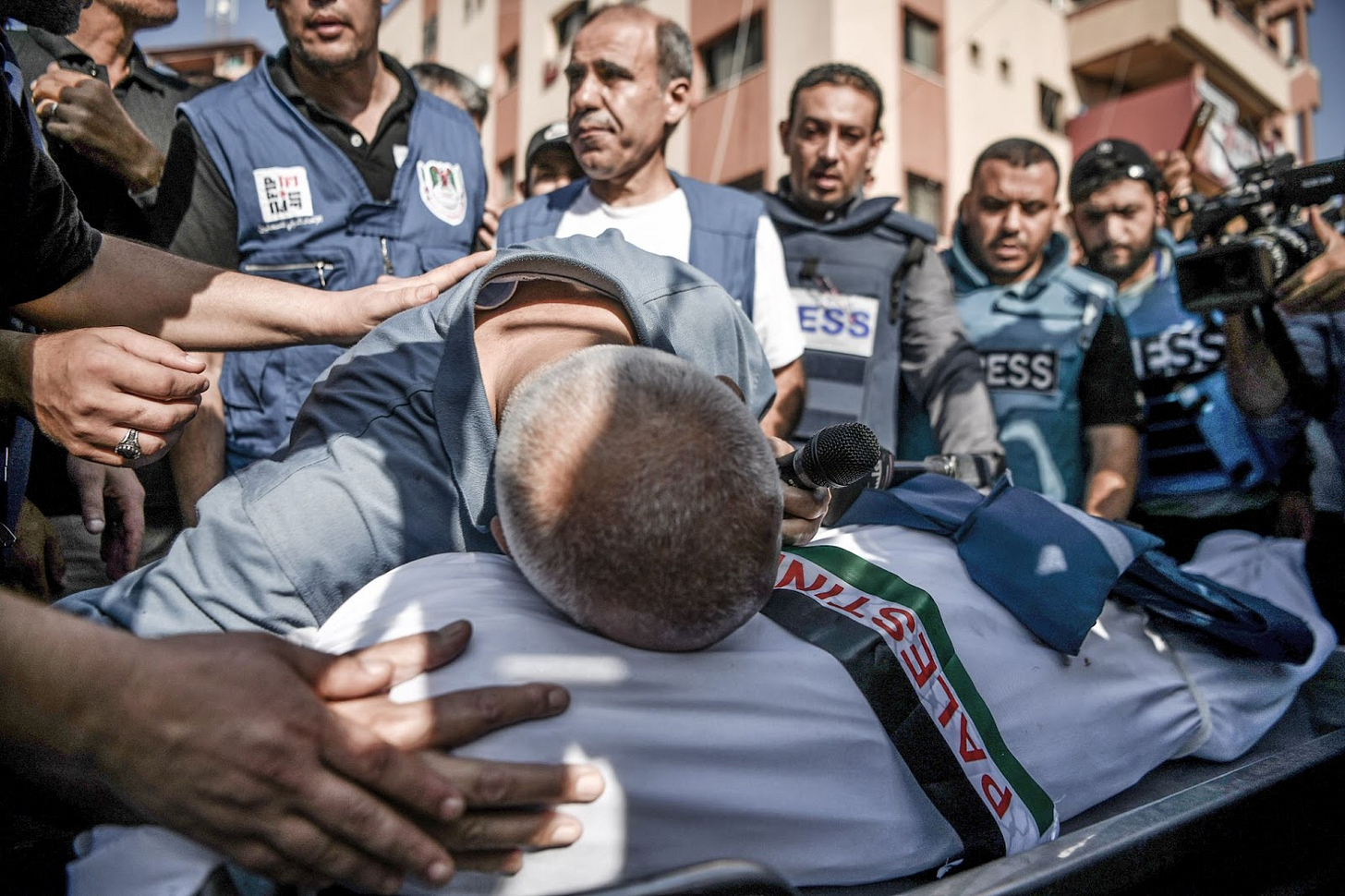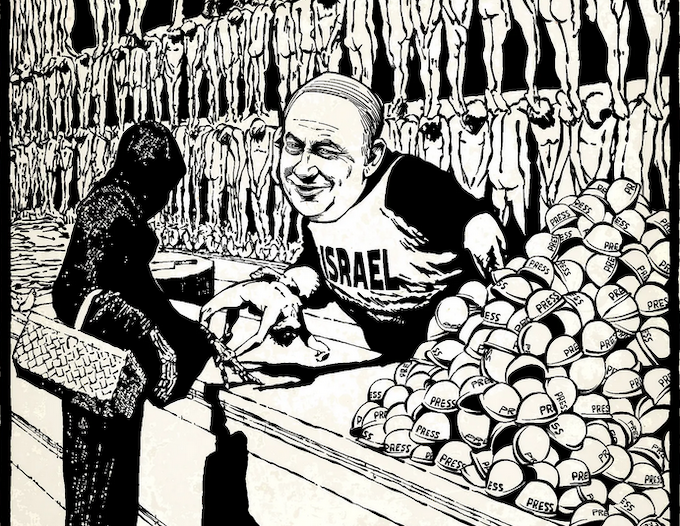The colleagues of these Palestinian journalists in the Western press broadcast from the border fence with Gaza decked out in flak jackets and helmets, where they have as much chance of being hit by shrapnel or a bullet as being struck by an asteroid. They scurry like lemmings to briefings by Israeli officials. They are not only the enemies of truth, but also the enemies of journalists doing the real work of war reporting.
When Iraqi troops attacked the Saudi border town of Khafji during the first Gulf War, Saudi soldiers fled in panic. Two French photographers and I watched frantic soldiers commandeering fire trucks and racing south. US Marines pushed the Iraqis back.
But in Riyadh, the press was told of our gallant Saudi allies defending their homeland. Once fighting ended, the press bus stopped a few miles down the road from Khafji. The pool reporters clambered out, escorted by military minders. They did stand-ups with the distant sound of artillery and smoke as a backdrop and repeated the lies the Pentagon wanted to tell.
Meanwhile, the two photographers and I were detained and beaten by enraged Saudi military police, furious that we had documented the panicked flight of Saudi forces, as we tried to leave Khafji.
My refusal to abide by press restrictions in the first Gulf War saw the other New York Times reporters in Saudi Arabia write a letter to the foreign editor saying I was ruining the paper’s relationship with the military. If not for the intervention of R.W. “Johnny” Apple, who had covered Vietnam, I would have been sent back to New York.
I do not fault anyone for not wanting to go into a war zone. This is a sign of normality. It is rational. It is understandable. Those of us who volunteer to go into combat — my colleague Clyde Haberman at The New York Times once quipped “Hedges will parachute into a war with or without a parachute” — have obvious personality defects.
Pretend war correspondents
But I fault those who pretend to be war correspondents. They do tremendous damage. They peddle false narratives. They mask reality. They serve as witting — or unwitting — propagandists. They discredit the voices of the victims and exonerate the killers.
When I covered the war in El Salvador, before I worked for The New York Times, the paper’s correspondent dutifully regurgitated whatever the embassy fed her. This had the effect of making my editors — as well as editors of the other correspondents who did report the war– question our veracity and “impartiality.”
It made it harder for readers to understand what was happening. The false narrative neutered and often overpowered the real one.
The slander used to discredit my Palestinian colleagues — claiming they are members of Hamas — is sadly familiar. Many Palestinian reporters I know in Gaza are, in fact, quite critical of Hamas. But even if they have ties with Hamas, so what?
Israel’s attempt to justify targeting journalists from the Hamas-run al-Aqsa media network is also a violation of Article 79 of the Geneva Convention.
I worked with reporters and photographers who had a wide variety of beliefs, including Marxist-Leninists in Central America. This did not prevent them from being honest. I was in Bosnia and Kosovo with a Spanish cameraman, Miguel Gil Moreno, who was later killed with my friend Kurt Schork.
Miguel was a member of the right-wing Catholic group Opus Dei. He was also a journalist of tremendous courage, great compassion and moral probity, despite his opinions about Spain’s fascist ruler Francisco Franco. He did not lie.
Seeking to crush
In every war I covered, I was attacked as supporting or belonging to whatever group the government, including the US government, was seeking to crush. I was accused of being a tool of the Farabundo Martí National Liberation Front in El Salvador, the Sandinistas in Nicaragua, the Guatemalan National Revolutionary Unity, the Sudanese People’s Liberation Army, Hamas, the Muslim-led government in Bosnia and the Kosovo Liberation Army.
John Simpson of the BBC, like many Western reporters, argues that the “world needs honest, unbiased eyewitness reporting to help people make up their minds about the major issues of our time. This has so far been impossible in Gaza.”
The assumption that if Western reporters were in Gaza the coverage would improve is risible. Trust me. It would not.
Israel bans the foreign press because there is a bias in Europe and the United States in favour of reporting by Western reporters. Israel is aware that the scale of the genocide is too vast for Western outlets to hide or obscure, despite all the ink and airtime they give to Israeli and US apologists.
Israel also cannot continue its systematic campaign of annihilation of journalists in Gaza if it has to contend with foreign media in its midst.
Israeli lies amplified by Western media outlets, including my former employer The New York Times, are worthy of Pravda. Beheaded babies. Babies cooked in ovens. Mass rape by Hamas. Errant Palestinian rockets that cause explosions at hospitals and massacre civilians. Secret command tunnels and command centers in schools and hospitals. Journalists who direct Hamas rocket units. Protesters of the genocide on college campuses who are antisemites and supporters of Hamas.
Israel ‘lies like it breathes’
I covered the conflict between the Palestinians and Israelis, much of that time in Gaza, for seven years. If there is one indisputable fact, it is that Israel lies like it breathes. The decision by Western reporters to give credibility to these lies, to give them the same weight as documented Israeli atrocities, is a cynical game.
The reporters know these lies are lies. But they, and the news outlets that employ them, prize access — in this case access to Israeli and US officials — above truth. The reporters, as well as their editors and publishers, fear becoming targets of Israel and the powerful Israel lobby.
There is no cost for betraying the Palestinians. They are powerless.
Call those lies out and you will swiftly find your requests for briefings and interviews with officials rebuffed. You won’t be invited by press officers to participate in staged visits to Israeli military units. You and your news organisation will be viciously attacked.
You will be left out in the cold. Your editors will terminate your assignment or your employment. This is not good for careers. And so, the lies are dutifully repeated, no matter how absurd.
It is pathetic watching these reporters and their news outlets, as Fisk writes, fight “like tigers to join these ‘pools’ in which they would be censored, restrained and deprived of all freedom of movement on the battlefield”.
When Middle East Eye journalists Mohamed Salama and Ahmed Abu Aziz, along with Reuters photojournalist Hussam al-Masri, and freelancers Moaz Abu Taha, and Mariam Dagga — who had worked with several media outlets, including the Associated Press — were killed in a “double tap” strike — designed to kill first responders arriving to treat casualties from initial strikes — at Nasser Medical Complex, how did Western news agencies respond?
‘Hamas camera’
“Israeli military says strikes on Gaza hospital targeted what it says was a Hamas camera,” the Associated Press reported.
“IDF claims hospital strike was aimed at Hamas camera,” announced CNN.
“Israel army says six ‘terrorists’ killed in Monday strikes on Gaza hospital,” the AFP headline read.
“Initial inquiry says Hamas camera was target of Israeli strike that killed journalists,” Reuters said.
“Israel claims troops saw Hamas camera before deadly hospital attack,” Sky News explained.
Just for the record, the camera belonged to Reuters, which said Israel was “fully aware” the news agency was filming from the hospital.
When Al Jazeera correspondent Anas al-Sharif and three other journalists were killed on August 10 in their media tent near al-Shifa Hospital, how was it reported in the Western press?
Pulitzer prize-winner
“Israel Kills Al Jazeera Journalist It Says Was Hamas Leader,” Reuters titled its story, despite the fact al-Sharif was part of a Reuters team that won a 2024 Pulitzer Prize.
The German newspaper Bild, published a front page story headlined: “Terrorist disguised as a journalist killed in Gaza.”
The barrage of Israeli lies amplified and given credibility by the Western press violates a fundamental tenet of journalism, the duty to transmit the truth to the viewer or reader.
It legitimizes mass slaughter. It refuses to hold Israel to account. It betrays Palestinian journalists, those reporting and being killed in Gaza. And it exposes the bankruptcy of Western journalists, whose primary attributes are careerism and cowardice.
Chris Hedges is a Pulitzer Prize–winning journalist who was a foreign correspondent for 15 years for The New York Times, where he served as the Middle East bureau chief and Balkan bureau chief for the paper. He is the host of show “The Chris Hedges Report”. This article is republished from his X account.














































